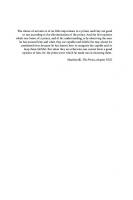Economic Philosophies: Liberalism, Nationalism, Socialism: Do They Still Matter? 3030533166, 9783030533168
The book shows the ideological underpinning of the economist’s work, and the ideological perspectives are those that hav
211 109 3MB
English Pages 264 [276] Year 2020
Table of contents :
Preface
Acknowledgements
Contents
1 Ideologies and Political Economy in the Nineteenth Century
1.1 Schumpeter: At the Origin of Political Economy
1.2 Radical and Moderate Enlightenment: Adam Smith and David Ricardo
1.3 Positivism and John Stuart Mill
1.4 Marginal Utility: Jevons and Marshall—Are We in the Field of Liberalism?
1.5 Economics as Pure Science: Léon Walras and Vilfredo Pareto
1.6 Historicism: Economic Nationalism and Marxist Socialism
1.7 Germany and Britain in the Nineteenth Century
1.8 The Political Economy as a System of “National Economy”
1.9 List: Protectionists, Mercantilists, Physiocrats and the Idea of Europe
1.10 German Economic Historicism
1.11 Marxist Socialism
References
2 Metamorphoses of Liberalism in the Twentieth Century
2.1 Causes of New Thinking on Liberalism
Political, Economic and Social Factors
The War
The Great Depression
Philosophical Developments: Ideal Historicism
2.2 Rathenau’s Statism Versus Einaudi’s “Liberism”
2.3 Pigou’s Doubts
2.4 Keynes’ Liberalism
2.5 Beveridge’s Welfare State
2.6 The Austrian School and Hayek’s Liberalism
2.7 The Chicago School
2.8 Ordoliberalism, or Authoritarian Liberalism
References
3 Enemies of Liberalism
3.1 Nationalism and Corporativism
3.2 Different Interpretations of Corporativism
3.3 Marxist Economic Philosophy After Marx: No Change
The Bolsheviks in Power
The N.E.P.
The Stalin Era, and Then Khrushchev: Extensive Capital Accumulation
Intensive Capital Accumulation. Slowdown
Perestroika
3.4 Adjusting and Interpreting Marx
3.5 Dobb’s Criticism of Free-Market Economics. Sraffa’s Reconciliation of Classical Economics and Marxism
3.6 Liberal Criticism of Marxism
3.7 Socialism by Default: Religion, Schumpeter and Polanyi
References
4 Neoliberalism
4.1 Keynes’ “Classical Situation”
4.2 Demise of Keynesian Consensus
4.3 Philosophical Attitudes: Economic Constitutionalism
4.4 New Classical Economics
4.5 A New “Classical Situation”?
4.6 Populism as a By-Product of Neoliberalism
References
5 As I See It
5.1 A Liberal View
5.2 Where a Liberal Would Head to, Now?
References
Author Index
Subject Index
Preface
Acknowledgements
Contents
1 Ideologies and Political Economy in the Nineteenth Century
1.1 Schumpeter: At the Origin of Political Economy
1.2 Radical and Moderate Enlightenment: Adam Smith and David Ricardo
1.3 Positivism and John Stuart Mill
1.4 Marginal Utility: Jevons and Marshall—Are We in the Field of Liberalism?
1.5 Economics as Pure Science: Léon Walras and Vilfredo Pareto
1.6 Historicism: Economic Nationalism and Marxist Socialism
1.7 Germany and Britain in the Nineteenth Century
1.8 The Political Economy as a System of “National Economy”
1.9 List: Protectionists, Mercantilists, Physiocrats and the Idea of Europe
1.10 German Economic Historicism
1.11 Marxist Socialism
References
2 Metamorphoses of Liberalism in the Twentieth Century
2.1 Causes of New Thinking on Liberalism
Political, Economic and Social Factors
The War
The Great Depression
Philosophical Developments: Ideal Historicism
2.2 Rathenau’s Statism Versus Einaudi’s “Liberism”
2.3 Pigou’s Doubts
2.4 Keynes’ Liberalism
2.5 Beveridge’s Welfare State
2.6 The Austrian School and Hayek’s Liberalism
2.7 The Chicago School
2.8 Ordoliberalism, or Authoritarian Liberalism
References
3 Enemies of Liberalism
3.1 Nationalism and Corporativism
3.2 Different Interpretations of Corporativism
3.3 Marxist Economic Philosophy After Marx: No Change
The Bolsheviks in Power
The N.E.P.
The Stalin Era, and Then Khrushchev: Extensive Capital Accumulation
Intensive Capital Accumulation. Slowdown
Perestroika
3.4 Adjusting and Interpreting Marx
3.5 Dobb’s Criticism of Free-Market Economics. Sraffa’s Reconciliation of Classical Economics and Marxism
3.6 Liberal Criticism of Marxism
3.7 Socialism by Default: Religion, Schumpeter and Polanyi
References
4 Neoliberalism
4.1 Keynes’ “Classical Situation”
4.2 Demise of Keynesian Consensus
4.3 Philosophical Attitudes: Economic Constitutionalism
4.4 New Classical Economics
4.5 A New “Classical Situation”?
4.6 Populism as a By-Product of Neoliberalism
References
5 As I See It
5.1 A Liberal View
5.2 Where a Liberal Would Head to, Now?
References
Author Index
Subject Index

![Economic Philosophies: Liberalism, Nationalism, Socialism: Do They Still Matter? [1st ed.]
9783030533168, 9783030533175](https://ebin.pub/img/200x200/economic-philosophies-liberalism-nationalism-socialism-do-they-still-matter-1st-ed-9783030533168-9783030533175.jpg)


![Erasmus and Voltaire : Why They Still Matter [1 ed.]
9781442685758, 9781487520007](https://ebin.pub/img/200x200/erasmus-and-voltaire-why-they-still-matter-1nbsped-9781442685758-9781487520007.jpg)





